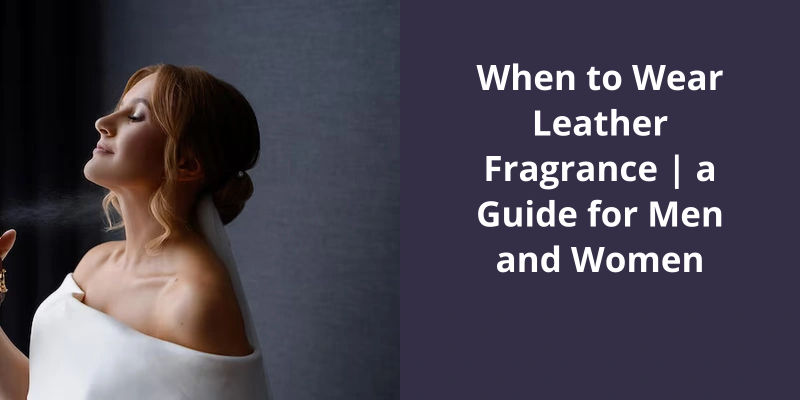Leather fragrances can be worn on various occasions, but they are particularly fitting for the colder months because of their warmth and depth. Likewise, these fragrances are well-suited for evening occasions owing to their luxurious and sophisticated scent profile. It’s also fine to wear them to casual events or work, but keep in mind that they can be quite powerful, so moderate use is urged. Lastly, if you want to make a bold statement or leave a lasting impression, a leather fragrance can be your aroma of choice because of its distinctive and characterful nature.

What Fragrance Family Is Leather In?
The scent of leather is often associated with luxury, sophistication, and power. It’s become a popular note in the fragrance industry due to it’s strong and distinctive aroma that can add depth and character to a perfume composition. However, leather fragrances can be challenging to work with as they can easily overpower other notes and create an unpleasant odor if not used in the right amount.
Oriental fragrances are known for their warm, sensual, and exotic notes, making them a perfect match for leather accords. Chypre fragrances, on the other hand, are often made up of a mix of fresh and woody notes, as well as mossy and fruity accents. The addition of a leather note can add a masculine and rugged element to the composition.
They’re used in a variety of fragrance families, including oriental, chypre, and woody fragrances, and are often associated with luxury and sophistication. Their robust and long-lasting aroma makes them perfect for unisex and masculine perfumes.
What Are Some Common Misconceptions About Leather Fragrances?
- Leather fragrances are harsh and overpowering.
- All leather fragrances smell the same.
- Leather fragrances are only for men.
- Leather fragrances are heavy and not suitable for everyday wear.
- Leather fragrances are too expensive.
In addition to being blended with other fragrances, leather essential oil can also be used in a variety of products to add a unique touch. From candles to room sprays, this versatile oil can add a touch of sophistication to any product. So, whether you’re looking to create your own personalized perfume or simply want to add a hint of leather to your home decor, there are many ways to incorporate this fragrance into your daily routine.
What Goes Well With Leather Essential Oil?
One popular combination is to mix leather essential oil with musky fragrances such as vanilla or sandalwood, which create a deep and long-lasting scent that’s a smooth yet rich aroma. These fragrances create a warm and inviting atmosphere, perfect for use in the colder months when people are looking for cozy and comforting scents to surround themselves with.
Another popular combination including leather essential oil is to pair it with citrus fragrances like orange or bergamot, which can add a bright and energetic element to the scent. This is ideal for use in spaces like offices or living rooms, where you might want to create a stimulating and invigorating atmosphere that can help to boost focus and productivity.
Leather essential oil can also be combined with other earthy scents such as patchouli or cedarwood, which help to create a grounding and calming effect. These scents work well in bedrooms or meditation spaces, where a relaxing atmosphere is desired.
For those who prefer a more feminine or floral scent profile, leather essential oil can be combined with scents like rose or lavender. These fragrances help to add a softer, more delicate dimension to the leather scent, making it more appropriate for use in personal care products like soaps or lotions.
But is leather perfume actually suitable for the summer season? It’s a common question among fragrance enthusiasts who want to keep their scent game on point all year round. While leather scents typically have a cozy and comforting feel that’s perfect for the winter months, there are some leather colognes that work surprisingly well in the summer. Read on to find out more about whether or not leather perfume is a good choice for the warmer months.
Is Leather Perfume Good for Summer?
While it might not seem like an obvious choice, leather perfumes can actually work quite well during the summer months. One reason for this is the way in which some leather perfumes are blended with other notes. For example, Acqua di Parma and Dana English Leather both incorporate floral and citrus notes that can really sing during the warmer months.
Leather scents are often associated with sophistication, confidence, and even a little bit of adventure. Wearing a leather perfume can help you feel more self-assured and give you a bit of a boost as you go about your day, whether youre heading to work or enjoying a weekend excursion with friends.
During the summer months, many people spend a lot of time outdoors, enjoying the sun and the fresh air.
Some people might find that they prefer lighter, more floral fragrances during the warmer months, while others might enjoy the way that leather scents can add a bit of depth and complexity to their summer wardrobe. Whatever your preference may be, don’t be afraid to experiment and try out different scents until you find one that really works for you.
However, there are certain factors to consider when applying a fragrance to make the most of the scent and ensure it lasts throughout the day.”
When Should You Wear a Fragrance?
Others wear it only for special occasions and choose their fragrance accordingly.”
It’s important to note that fragrances react differently to different people and situations. Generally, it’s recommended to apply fragrance to your pulse points, such as your wrists, neck, and behind your ears. This is because these areas are warmer and can intensify the scent, making it last longer. However, if you’ve sensitive skin, it’s better to apply it to your clothes instead.
Another factor to consider is the season. In the warmer months, lighter fragrances such as citrus or floral scents are generally preferred. In the cooler months, richer and warmer scents such as vanilla or musk are more appropriate. However, this isn’t a hard and fast rule and some people prefer to wear their favorite scent year-round.
The time of day can also influence your fragrance choice. During the daytime, lighter fragrances are generally preferred as they’re less overpowering. In the evening, you can opt for a more intense fragrance that will last throughout the night. It’s also important to consider the occasion – for a formal event, you may want to choose a more sophisticated scent, whereas for a casual outing, a lighter and more playful fragrance may be suitable.
Ultimately, it’s important to choose a fragrance that makes you feel confident and comfortable. Dont be afraid to experiment and try new scents, as you may be pleasantly surprised by what you discover. Trust your nose, and you cant go wrong.
How to Choose the Right Fragrance for Your Personality
Choosing the right fragrance for your personality requires understanding your preferences, lifestyle, and taste. You should consider the different scent families, strengths, and notes to select a fragrance that complements your style, enhances your mood, and expresses your individuality. Experiment with different fragrances, test them on your skin, and ask for feedback from others to make an informed decision.
The art of fragrance creation is a complex one, with perfumers constantly exploring new scent combinations to create the perfect aroma. When it comes to leather, the possibilities are limitless. From woody to floral, perfumers can take leather on a variety of fragrant journeys, with each blend perfectly complementing the sensuality of leather. So, what scents work best with leather? Patchouli, black tea, and tobacco are some of the most popular options, but there’s much more to discover in the world of leather fragrances.
What Scent Blends Well With Leather?
Leather is a versatile material that’s been used in fashion, upholstery, and crafts for centuries. It’s a distinct smell that’s often associated with quality, durability, and luxury. When it comes to pairing scents with leather, there are several options to consider that can enhance or complement the natural aroma of the material.
One of the most popular scents to pair with leather is patchouli. This earthy essential oil has a woody, musky scent that blends well with the warm, rich tones of leather. Patchouli is often used in fragrances for both men and women, as it’s a sensual and exotic quality that can add depth and complexity to any scent.
Another scent that pairs well with leather is black tea. The warm, tannic aroma of tea can add a subtle sweetness to the leather, creating a comforting and inviting scent that’s perfect for fall and winter. Black tea is often used in fragrances that evoke feelings of coziness, relaxation, and nostalgia.
Tobacco is also a great scent to pair with leather. The smoky, slightly sweet aroma of tobacco can add a sense of intrigue and sophistication to the leather, creating a scent that’s both alluring and mysterious. Tobacco is often used in fragrances for men, as it’s a bold, masculine quality that’s perfect for evening and formal occasions.
When it comes to fragrances that feature leather as a main note, womens chypres and mens fragrances are the most common. Chypres are fragrances that are characterized by their woody, mossy, and floral notes, and they often feature leather as a supporting note.
However, perfumers can take leather on all sorts of fragrant journeys. For example, leather can be paired with floral notes like rose and jasmine to create a romantic and sophisticated scent, or it can be paired with sweet notes like vanilla and chocolate to create a warm and cozy fragrance for fall and winter.
The frequency of wearing perfume depends not only on personal preference but also on the occasion and time of year. While some people may wear their preferred scent every day, others may only reserve it for special events. Multiple favourite perfumes also create diversity in daily use. Let’s discover what motivates people to wear perfumes every day and how to choose the right fragrance.
How Often Do People Wear Perfume?
In general, different people have different preferences when it comes to wearing perfume. Some prefer to wear it more frequently than others, while some may not wear it at all. It ultimately depends on factors such as personal taste, cultural norms, and social settings. Many people consider wearing perfume to be a part of their daily routine, similar to brushing their teeth or putting on makeup. This could be attributed to the fact that a good fragrance can help boost confidence and make one feel more attractive.
On the other hand, some may avoid wearing perfume due to allergies, sensitivity to fragrances, or personal beliefs. There are also certain professions or workplaces that have strict rules on fragrance usage, such as hospitals or planes. Additionally, the weather and seasons can also play a role in how often people wear perfume. For example, heavier scents may be more suitable for colder weather, while lighter scents may be preferred in the summer.
Different Types of Perfumes and Their Ingredients
- Floral perfumes – made with flower extracts, such as rose, jasmine, and lavender
- Citrus perfumes – made with fruits like lemon, orange, and grapefruit
- Woody perfumes – made with wood extracts like sandalwood, cedar, and oud
- Oriental perfumes – made with spices, balsams, and resins like vanilla and amber
- Aquatic perfumes – made with water and marine notes like sea salt and seaweed
- Fruity perfumes – made with a combination of fruit extracts like raspberry, peach, and strawberry
- Chypre perfumes – made with earthy and mossy notes like oakmoss and patchouli
- Gourmand perfumes – made with sweet and edible notes like caramel, chocolate, and coffee
Conclusion
Whether you're going for a casual daytime look or dressing up for a formal event, a leather scent can enhance your overall style and presence. However, the key is to choose the right fragrance and wear it in the appropriate setting. But if you're out in the sun or engaging in strenuous activity, a heavy leather fragrance may be overwhelming.





